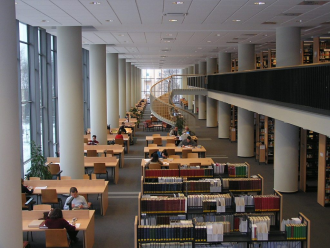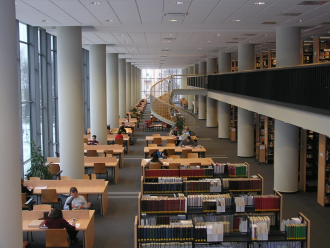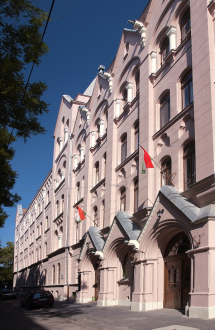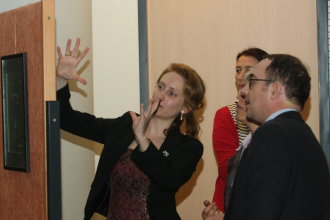Szegedi Tudományegyetem - Ahol tudás és szándék találkozik
 Régi doktori képzéses anyagok
Régi doktori képzéses anyagok
Chair: Prof. Benő Csapó DSc
Institute of Education
H–6722 Szeged, Petőfi sgt. 30–34., Hungary
Phone/Fax: (+36 62) 420 034
E-mail: csapo@edpsy.u-szeged.hu
Co-operating institutions
University of Szeged, Faculty of Arts
Institute of Education
Institute of Psychology
University of Szeged, Faculty of Medicine
Department of Physiology
Department of Behaviour Sciences
Eötvös Loránd University, Budapest
UNESCO Chair for ICT in Education
Hungarian Academy of Sciences
Research Group on the Development of Competencies
Educational sciences show the most dynamic progress among social sciences, primarily because knowledge has become the dominant factor of economic competitiveness and social development in recent decades, in a process in which the reproduction of knowledge attracts growing attention. In the most advanced regions of the world, resources, infrastructure and human capital allocated for research on learning and instruction are increasing. The dynamic progress creates a need for experts in research on learning and instruction in Europe as well.
 The Doctoral School of Educational Sciences considers its main objective to train new generations of researchers for educational sciences as a branch of modern, empirically based social sciences. Its curriculum is centred around the research focus that emerged from the traditions of the University of Szeged, i.e. formal education, instruction and learning. At the same time, the objective of the Doctoral School is to prepare students for engaging in a wide spectrum of research activities related to learning and instruction, for applying a plethora of research methods, and for studying the social, economic and historical conditions of schooling.
The Doctoral School of Educational Sciences considers its main objective to train new generations of researchers for educational sciences as a branch of modern, empirically based social sciences. Its curriculum is centred around the research focus that emerged from the traditions of the University of Szeged, i.e. formal education, instruction and learning. At the same time, the objective of the Doctoral School is to prepare students for engaging in a wide spectrum of research activities related to learning and instruction, for applying a plethora of research methods, and for studying the social, economic and historical conditions of schooling.
The predecessor of the SZTE Doctoral School of Education, the Development of Cognitive Competence PhD Programme was launched in 1993. It was firmly rooted in the empirical research traditions of the (then) Department of Education, which were comprised of several projects in educational assessment and evaluation as well as experiments in learning and instruction. The first of these started in the early 1970s and focused on the development and standardisation of tests for elementary education. In the 1980s, the scope of research widened and the research focus shifted to the identification of abilities and skills that determine academic achievement. Since the 1990s, the information processing paradigm and cognitive sciences have informed our research programmes. The central questions of recent work are related to aspects of the quality of students' knowledge, e.g. the depth of understanding, the organisation of knowledge, and the developmental processes of skills and competencies.
The Doctoral School of Educational Sciences received its new accreditation in its present form in 2003. Other teaching and research units of the University of Szeged joined the core group of the previous PhD programme and prominent researchers from other universities and institutes also accepted the invitation of the School. The scope of research broadened further and the number of participating faculty members increased considerably.
The Doctoral School of Educational Sciences is organised into six closely related programmes. Two of these, Teaching and Learning and Educational Evaluation, represent continuity from the beginnings. The Cognitive Neuroscience and Psychology in Education programme provides a deep insight into the biological processes of learning and into the foundations of teaching and learning. Health Education is an area in applied research gaining importance. TheInformation and Communication Technologies in Education programme integrates recent technological developments and a new trend in the culture of education. Finally, the History of Education programme approaches educational thinking form the perspective of intellectual history.
 The distinguished scientists of the Doctoral School of Educational Sciences contribute to the development of educational system in several ways, by participating in the work of academic and educational committees as well. They are active in international research associations and developmental organisations, such as the OECD's information and communication technologies projects and the Programmes for International Student Assessment (PISA).
The distinguished scientists of the Doctoral School of Educational Sciences contribute to the development of educational system in several ways, by participating in the work of academic and educational committees as well. They are active in international research associations and developmental organisations, such as the OECD's information and communication technologies projects and the Programmes for International Student Assessment (PISA).
Educational Programmes
1. Teaching and Learning
Programme director: Prof. Benő Csapó DSc
Institute of Education
H–6722 Szeged, Petőfi sgt. 30–34., Hungary
Phone/Fax: (+36 62) 420 034
E-mail: csapo@edpsy.u-szeged.hu
Research programmes
(A) The development of cognitive skills and competencies
– Identifying and describing the structure of cognitive skills
– Developmental processes of cognitive skills
(B) The organisation of students' knowledge and indicators of its quality
– Complex problem solving, application, and transfer of knowledge
– Probabilistic and correlational reasoning in science and social studies
– Problems of the development of mathematical reasoning
– The role of inductive and analogical reasoning in acquiring knowledge
– Conceptual understanding, conceptual development, and conceptual change
– Affective factors of learning, motivational processes, and self-regulated learning
(C) Developing students’ skills and competencies
– Developing communication skills through teaching content
– Devising training programmes for students with developmental problems
(D) Teaching methods for improving the quality of knowledge (understanding and transferability)
– Problem Based Learning
– Content Based Language Learning
– Using cognitive maps to improve semantic organisation
– Meta-cognition
– Group work and collaborative learning
2. Educational Evaluation
Programme director: Prof. Tibor Vidákovich CSc
Institute of Education
H–6722 Szeged, Petőfi sgt. 30–34., Hungary
Phone/Fax: (+36 62) 420 034
E-mail: t.vidakovich@edpsy.u-szeged.hu
Research programmes
(A) Applications of classical and modern test theories
– Devising new assessment instruments
– Applying modern test theories in analysing data on reasoning skills
– Stability of students' knowledge structures
(B) Issues in test and item development
– Item banking
– Test equating
(C) Diagnostic educational evaluation
– Designing criterion-referenced assessment tools
– Applications of diagnostic tests in educational practice
(D) Analysing educational added value
– Conceptions of added value in education
– Added value analysis in practice
(E) Theoretical and practical issues of examinations
– New examination systems
– New methods of examinations; portfolio assessment
(F) System level surveys
– Monitoring educational progress
– National and international surveys and their washback effects
 3. Information and Communication Technologies in Education
3. Information and Communication Technologies in Education
Programme director: Assoc. Prof. Gyöngyvér Molnár PhD
Institute of Education
H–6722 Szeged, Petőfi sgt. 30-34., Hungary
Phone/Fax: (+36 62) 420 034
E-mail: gymolnar@edpsy.u-szeged.hu
Research programmes
(A) Modern educational paradigm in ICT
– Developing abilities by the means of ICT
– Digital competencies
– Comparison of traditional and ICT methods
– Efficiency of application of ICT in education
– Computerised assessment
(B) ICT and cross-curricular competencies
– E-learning as a means of promoting knowledge-integration
– Development of ICT competencies
(C) Application of ICT to help students with special needs
– ICT in special education
– Bridging digital divide; ICT education for low SAS children
4. Health Education
Programme director: Assoc. Prof. Katalin Barabás CSc
Department of Behavior Sciences
H–6722 Szeged, Szentháromság u. 5., Hungary
Phone/Fax: (+36 62) 420 530
E-mail: bar@nepsy.szote.u-szeged.hu
Research programmes
(A) Culture and health
– Concepts of health in children
– Health education in families
– Differences of health consciousness
(B) Protective factors in health
– Protective factors in the Hungarian school-age populations
(C) Health education and health development at school
– The role of curricula in health education; cross-curricular issues
– The role of the school environment
– The relationship between health-care systems and school
– Development of health consciousness
– Application of knowledge acquired at school in health education
– Health-related misconceptions
(D) Assessing the efficiency of health education
– Indicators of the efficiency of health education
– Monitoring the efficiency of health education
5. Cognitive Neuroscience and Psychology in Education
Programme director: Assoc. Prof. Ágnes Szokolszky PhD
Institute of Psychology
H–6722 Szeged, Egyetem u. 2., Hungary
Phone/Fax: (+36 62) 544 509
E-mail: Szokolszky.Agnes@edpsy.u-szeged.hu
Research programmes
(A) The psychology of adolescence
– Coping with stress in adolescence
– Planning and decision-making in adolescence
– Self-concept and self-evaluation in adolescence
(B) Informal, formal and non-formal education and learning
– Family socialisation as a determinant of primary socialisation
– Environmental psychology: issues of home and school
– Situated learning and learning in a mentor–mentee relationship
(C) The development and the developmental problems of numeracy skills
– The role of numeric representations in learning mathematics
– Causes of developmental discalculia
– Tests for diagnosing discalculia
(D) Developmental processes of visual abilities
– Development of the visual perception of shapes and forms
– Development of contrast-sensitivity
– Studying electrophysiological bases of the development of abilities (EEG, ERG)
– The development of the parvocellular and the magnocellular visual pathways
(E) Psycho-physiological and electro-physiological analyses of learning and attention
– Visual evoked potential parameters in children
– EEG gamma activity
– Psycho-physiological experiments

6. History of Education
Programme director: Prof. Béla Pukánszky DSc
Institute of Special Needs Education
H–6722 Szeged, Hattyas u. 10., Hungary
Phone/Fax: (+36 62) 546 044
E-mail: comenius@edpsy.u-szeged.hu
Research programmes
(A) The history of teacher education at Kolozsvár-Szeged University
– The system and practice of teacher training at Kolozsvár-Szeged University
– The role of prominent professors
(B) The development of the Hungarian educational sciences until 1948
– Major theoretical paradigms
– The role of educational sciences in the training of teachers
(C) Child conceptions of the Hungarian teacher-training textbooks in the 19th–20th centuries
– Changes in conceptions of childhood
– Idealised views of childhood
– Child-conceptions influencing educational practice
Selected Courses
Researching the development of cognitive skills and competencies in formal education (Prof. Benő Csapó)
The course covers the following areas: Theoretical sources of studying developmental processes; Psychometric traditions, the Piaget-school, Neo-Piagetian paradigms, the information-processing paradigm, and the constructivist approach; Qualitative and quantitative methods, cross-sectional and longitudinal assessment; Analysing developmental data, modelling and simulation; Improving abilities in school contexts; Stand-alone training programmes and the embedding approach; Experiments on the modifiability of developmental tendencies.
Theory of assessment (Prof. Tibor Vidákovich)
The course covers the following areas: The classical test theory and its application in test-development; Concepts of reliability, validity, and objectivity; The development of modern tests theories and the diversity of analysis models; The foundations of Rasch-models; Item taxonomy and item writing; Test construction, test equation; Norm- and criterion-referenced testing; Diagnostic testing.
Principles of cognitive neuroscience (Prof. György Benedek)
The course provides an introduction into the structure and functions of the human nervous system; basic neurobiological functions; information processing and blood supply of the human brain; motor, sensor and vegetative nerve functions; basic terminology of classical and recent experiments; associative functions; anatomical and physiological functions; neural bases of integrative functions in sleep, awareness, attention, speech, learning, memory and consciousness.
Information competencies (Assoc. Prof. Gyöngyvér Molnár)
The course introduces basic research methods of ICT applications and recent international research findings. Discussions concerning the construct of information competencies cover scanning, skimming, and processing of information; different programming languages; effects of experiments regarding processing data, texts and visual images on the development of cognitive abilities, motivation and communicative competencies in the first language.
Educational psychology (Prof. Zsuzsanna Vajda)
The course explores the following areas: The relationship between education and psychology; Historical aspects of childhood and adulthood; Mediation of behavioural norms and rules; Reward, punishment, and other social mechanisms; Functions of the family; Parental belief systems and expectations; Educational attitudes; The roles of the social environment; The school as a cultural institution; The school and cognitive development; Motivation: types, roles, effects; Teachers’ roles; Teacher–student relationships; Education as socialisation.
Research on health education (Assoc. Prof. Katalin Barabás)
The course covers the following areas: Philosophical and historical issues in health education; Health as a value – research findings; Life style and health: sociological aspects; Medical anthropology; Cultural aspects of health consciousness; Primary prevention; Risk-taking and protective models; Features of health education in different contexts; Methodological considerations; Ethical issues; Designing health education programmes.
The epistemology of children’s education (Prof. Béla Pukánszky)
Participants of the course will gain insight into a variety of historical, philosophical and educational views on humans, children and education; changes in the perception of human character, children, and educational practices in different historical periods; ideal portrayals of the child; metaphors in educational literature; child rearing and education in the 20th century; childhood and education; perception of children in reform pedagogies; pessimistic views on education (black pedagogy; anti-pedagogy).
Representative dissertations (title, author, supervisor, year)
- Teachers’ thinking about children’s cognitive improvement and development, Mária Hercz, Prof. Benő Csapó, 2007
- Content-based criterion-oriented skills improvement in grade 5, Róbert Pap-Szigeti, Prof. József Nagy and Assoc. Prof. Krisztián Józsa, 2009
- Applying concept maps to facilitate meaningful learning, Anita Habók, Prof. Benő Csapó, 2009
- Issues in the application of science knowledge: Investigating the understanding of real-life phenomena 1996–2006,Mária B. Németh, Prof. Benő Csapó, 2009


 Print article
Print article Send link
Send link Share
Share



